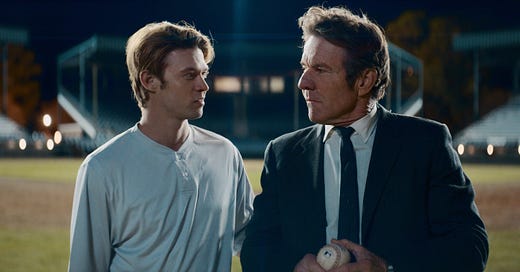The Hill
An unabashed, inspirational piece of Americana in the true story of a boy determined to play baseball despite a body cursed with frailty and a father too full of the Lord.
Like its spiritual ancestors — “Rudy,” “Hoosiers” and “The Rookie” — “The Hill” is a sports story that’s unabashedly Americana. It’s about boys who come from nothing and dream of making it big, cursed with seemingly insurmountable challenges but also blessed with with the grit and talent to try.
This is the sort of filmmaking in which the main characters talk openly and ironically about their faith, their family, their way of life. They struggle and suffer setbacks that would make most any man quit… but didn’t.
Some will call it cornpone. I guess it is a little corny at times. But if the movie is a bit obvious about reaching for those inspirational notes, it knows just how to pluck the heart strings.
Screenwriter Angelo Pizzo has made an entire career from this sort of stuff — “Hoosiers,” “Rudy,” “Bleed for This” and the criminally under-appreciated “The Game of Their Lives.” Co-writer Scott Marshall Smith knows sports movies too from “The Game Stands Tall.”
(Bill Chaffin, Stephen Hintz and Aric Hornig wrote the source material.)
It even stars Dennis Quaid, who looks like an athlete and has played plenty of them, from “Breaking Away” to “Everybody’s All-American.” For me one of his most enduring roles is “The Rookie,” as an over-the-hill baseball coach who gives the majors one last try.
Quaid’s a little long in the tooth to be on the baseball diamond, instead playing the father of Rickey Hill. The kid was cursed with a frail body: degenerative spine disease, born with legs so spindly they thought he’d never walk. He wore Forrest Gump-style leg braces until the age of 10, teetering around and getting called “robot kid” by the local punks.
But boy, Rickey could hit the ball. From rocks struck with sticks over fences — and into farm truck windshields — until he finally gained enough size and strength to wield a bat, he was the boyhood story of King David made true.
In this iteration, though, Goliath is actually his father, James Hill, a dirt-poor preacher who toted his family around Texas anywhere they could get a rectory to sleep in and a few dollars a month to play pastor to ungrateful hayseeds. James sees baseball as a sinful expression of pride, a distraction from Rickey’s true calling — which he just happens to think is following in his own footsteps.
This battle between father and son is the primary antagonism driving the movie. James thinks God has laid an incredible challenge before his son, to overcome his weak body and the temptations of earthly pride. Rickey comes to believe that baseball is his true calling, and can’t understand why his father refuses to support him — never even coming to watch him play.
Rickey is played as a youngster by Jesse Berry during the first half of the movie, and by Colin Ford as a high school senior in the second. Their heartfelt performances match pretty well, giving Rickey a sort of quiet, humble determination, a good kid who’s genuinely hurt at having to defy his earthly father in order to serve the one in heaven.
Joelle Carter plays his mother, trying to keep peace in the house and encourage her boy while staying in the traditional wife role. Much more willing to question his authority is Bonnie Bedelia as her mother, a Godly woman herself who respects her son-in-law but is the one to speak out when James quotes so much scripture he forgets his human empathy.
Siena Bjornerud plays Gracie, a girl who teases Rickey as a boy about being his girlfriend, but who turns up later like a forgotten promise being kept. Mason Gillett shines in the early section as Rickey’s older brother, Robert, who acts as a selfless shield for their father’s wrath (though the character kind of gets lost in the older section).
And who should turn up in the final big-game sequence but possibly my favorite “that guy” film actor of all time, Scott Glenn. He plays real-life pro baseball scout Red Murff, who’s willing to give Rickey his shot but will not cut him one ounce of slack in doing so, despite dire circumstance that occur and serve as the “darkest hour” before the payoff.
As Murff, Gleen lurks in the infield like a pitiless shark, chewing up players’ lifelong dreams for lunch. “I’m not looking for guys who play baseball. I’m looking for baseball players,” he growls.
Look, you know how this movie’s going to end… we all do. Sports movies don’t resolve with Mighty Casey striking out, which is why they rewrote the ending of “The Natural.” That’s probably my favorite sports movie of all time, and I wouldn’t have it any other way.
At a few ticks over two hours, “The Hill” could have used some judicious paring, particularly around the middle portion as the dynamic between Rickey and his father has been properly established, and then gets a few more spins just for the heck of it. Director Jeff Celentano is a veteran whose last credit was the boxing drama “Glass Jaw,” but sometimes displays a rookie’s sense of pacing.
Really, this is as much a faith-of-my father movie as a sports story. Rickey Hill was born with a gift, but also weighed down by a tremendous burden. It wasn’t the body that often betrayed him, but a patriarchal figure who thought he could substitute the wisdom of Solomon for a dad’s love.
Both men eventually find one another on the field.





